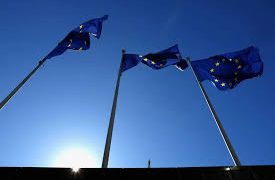The European Union’s long-debated Chat Control legislation has been put on hold, leaving member states, tech companies, and digital rights advocates grappling with its future. The initiative, designed to prevent child sexual abuse online, would have required messaging platforms to monitor private communications using automated tools. However, growing concerns over privacy, civil liberties, and technical feasibility have stalled its progress. Meanwhile, countries along Europe’s eastern flank remain largely passive, neither championing the proposal nor mounting organized opposition, reflecting both political caution and strategic divergence within the EU.
Origins of Chat Control
The European Commission proposed Chat Control as part of a broader effort to strengthen online safety. Its primary goal is to detect and prevent the circulation of child sexual abuse material (CSAM) across messaging platforms like WhatsApp, Signal, and Telegram. The regulation mandates that digital platforms deploy automated scanning technologies to identify illegal content, even in private or encrypted communications.
The proposal immediately sparked debate among governments, tech firms, civil society groups, and privacy advocates. Supporters argue that such monitoring is crucial for protecting vulnerable children and preventing the rapid spread of abusive material online. Critics, however, warn that the regulation could erode privacy, weaken encryption, and set a troubling precedent for mass surveillance.
Parliamentary Hesitation
Despite the Commission’s push, the European Parliament has expressed significant reservations. Committees questioned the technical feasibility of scanning private messages while remaining compliant with the EU’s General Data Protection Regulation (GDPR). Lawmakers also highlighted potential conflicts with fundamental rights enshrined in the EU Charter of Fundamental Rights, including the right to privacy and freedom of expression.
This pause reflects the broader challenge of balancing online safety with civil liberties. While countries like Germany and France have historically favored stringent monitoring, eastern member states have been more cautious. The legislative delay illustrates the difficulty of crafting rules that satisfy both security goals and digital rights protections.
Eastern Europe’s Passive Approach
Countries on the EU’s eastern flank, such as Poland, Hungary, and the Baltic states, have remained largely passive regarding Chat Control. Unlike Western European nations that actively debate and negotiate the legislation, these countries have avoided taking strong public positions. Analysts point to several reasons:
- Political caution: Governments may fear domestic backlash or straining relations with the European Commission.
- Other priorities: Many eastern states focus on geopolitical security, especially amid ongoing conflicts like the war in Ukraine. Digital policy issues may be secondary.
- Strategic divergence: Some states prefer technological autonomy and minimal EU interference, waiting for broader consensus before acting.
This passivity affects EU cohesion. Without active participation from eastern members, achieving a unified stance becomes more challenging, potentially delaying implementation indefinitely.
Privacy and Civil Liberties Concerns
A central criticism of Chat Control is its impact on privacy. Monitoring encrypted communications could require breaking end-to-end encryption, which privacy advocates argue would compromise the security of millions of EU users. Groups such as Privacy International and the Electronic Frontier Foundation warn that surveillance might extend beyond CSAM detection, allowing governments to monitor political dissent, journalists, and activists.
Experts also caution that broad definitions of illegal content, combined with automated scanning tools, could result in false positives. Innocent users may have their conversations flagged, chilling free speech. Critics insist that lawmakers carefully weigh child protection goals against fundamental rights to avoid unintended consequences.
Tech Industry Resistance
The technology sector has voiced strong opposition to Chat Control. Platforms that rely on end-to-end encryption, including WhatsApp and Signal, warn that complying would require major architectural changes that could reduce user trust. Tech companies also argue that privacy-preserving solutions already exist, such as hash-matching databases and cooperation with law enforcement, which can combat CSAM without invasive monitoring.
Implementing universal monitoring tools across millions of users would also be expensive and complex. Companies fear potential liability for failing to detect illegal content, as well as reputational damage for being seen as surveillance enablers.
Implications for EU Policy Making
The stalemate over Chat Control highlights deeper challenges in EU digital governance. The bloc must navigate the tension between centralizing digital oversight and respecting national sovereignty. Eastern Europe’s passivity underscores the difficulty of achieving a one-size-fits-all approach, especially when countries prioritize security, privacy, and technological autonomy differently.
The delay also illustrates the EU’s broader struggle to regulate digital platforms effectively. Policymakers must reconcile child protection, civil liberties, technological innovation, and industry feasibility—a task that remains politically sensitive and technically complex.
Possible Outcomes
Several scenarios could unfold. Lawmakers may revise Chat Control to include stronger privacy safeguards, such as transparency reports, independent audits, and limits on automated scanning. Alternatively, eastern member states may push for exemptions, complicating approval further.
If the law stalls indefinitely, it could encourage tech companies to resist regulations, slow protective measures, and result in inconsistent national policies. Conversely, a carefully revised law could set a global precedent for balancing child protection with digital rights, serving as a model for other regions.
Global Attention
The debate has attracted international attention. Privacy advocates, human rights groups, and tech firms worldwide are closely watching the EU, seeing it as a leader in digital regulation. The outcome could influence discussions on encrypted communications, surveillance, and online child safety in other jurisdictions.
The standoff also underscores the EU’s role in shaping global digital norms. How Brussels navigates the issue may affect international cooperation on cybersecurity, law enforcement, and digital privacy standards.
Conclusion
The pause on Chat Control reflects the EU’s struggle to balance child protection with privacy and civil liberties. While Western European nations continue debating technical and legal challenges, eastern countries remain largely passive, highlighting the bloc’s political and strategic diversity.
As discussions continue, the EU faces critical choices: revise the law to strengthen privacy, enforce it across all members, or delay until broader consensus emerges. The outcome will shape the future of digital regulation, civil liberties, and online safety in Europe.
Ultimately, Chat Control exemplifies the EU’s broader digital policy challenge: fostering security and innovation while respecting fundamental rights, national priorities, and rapidly evolving technology. Eastern Europe’s passivity may slow progress, but it also illustrates the complexities of governance in a diverse and interconnected union.






